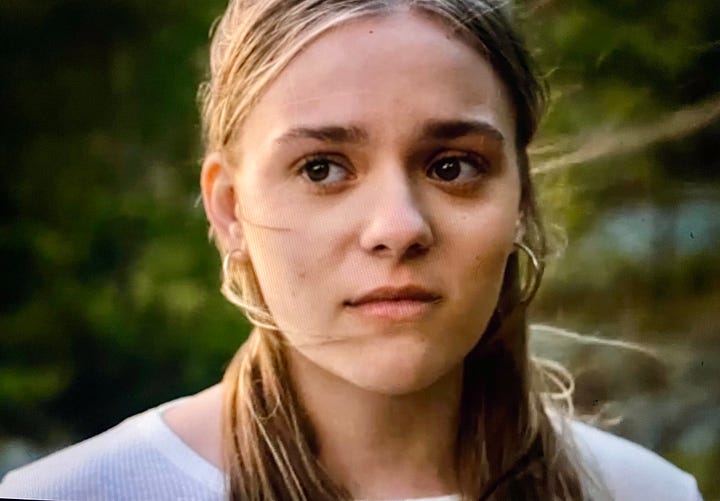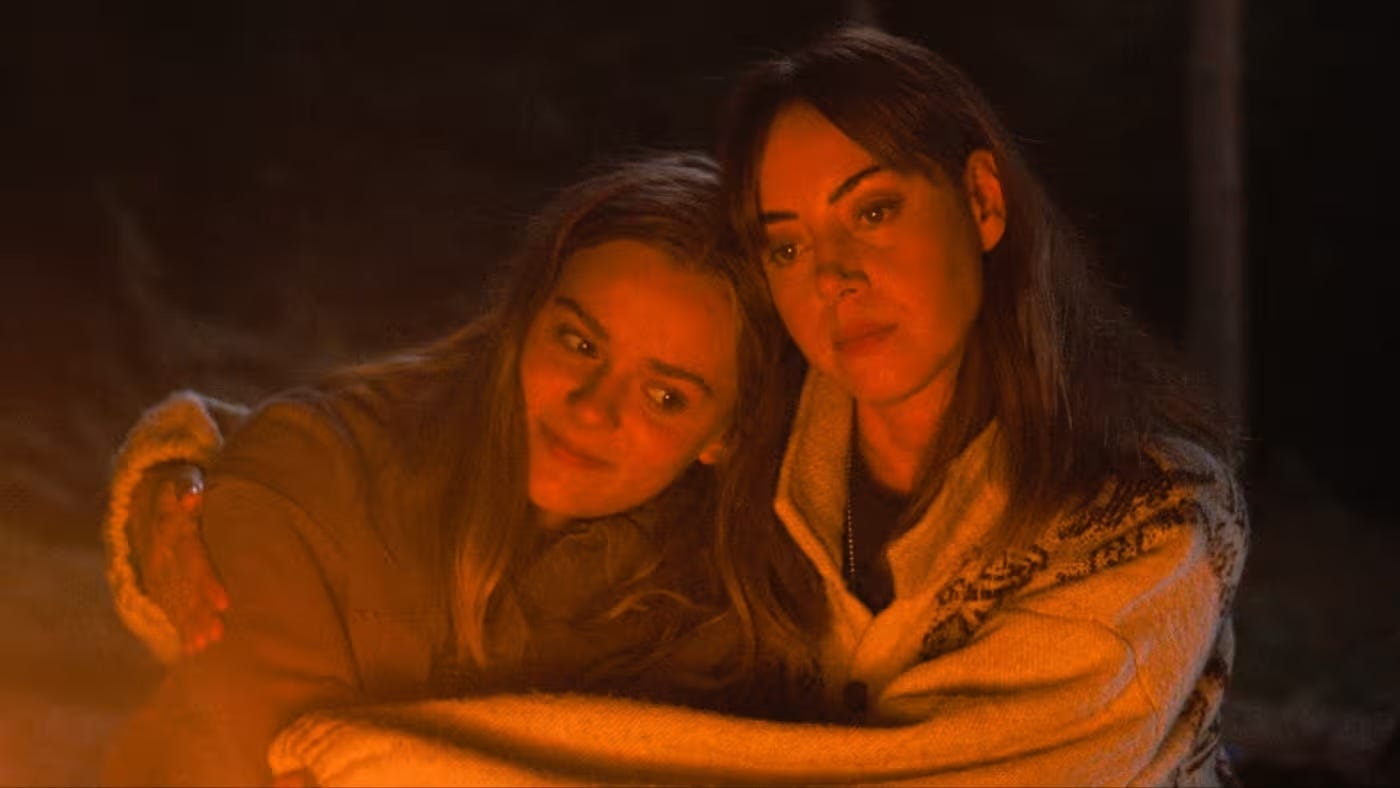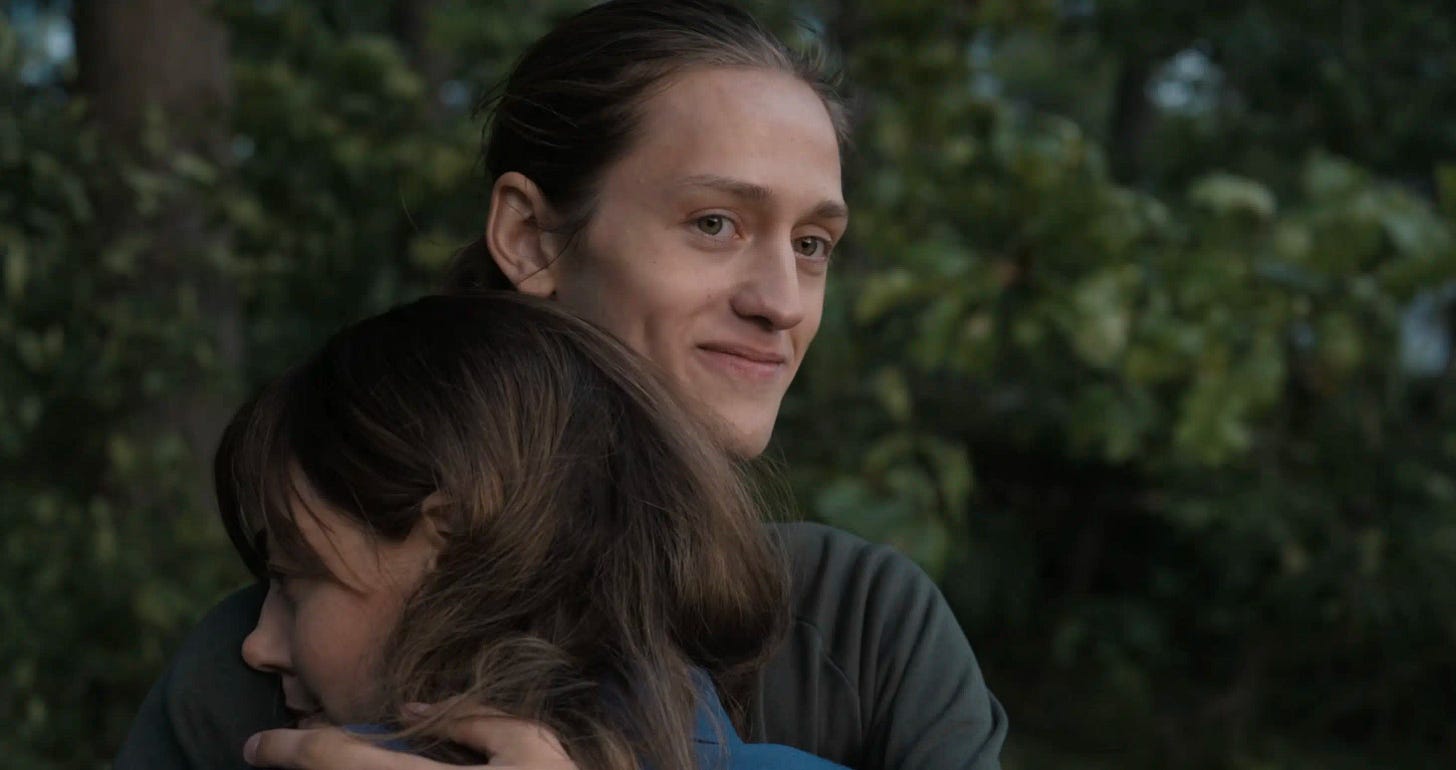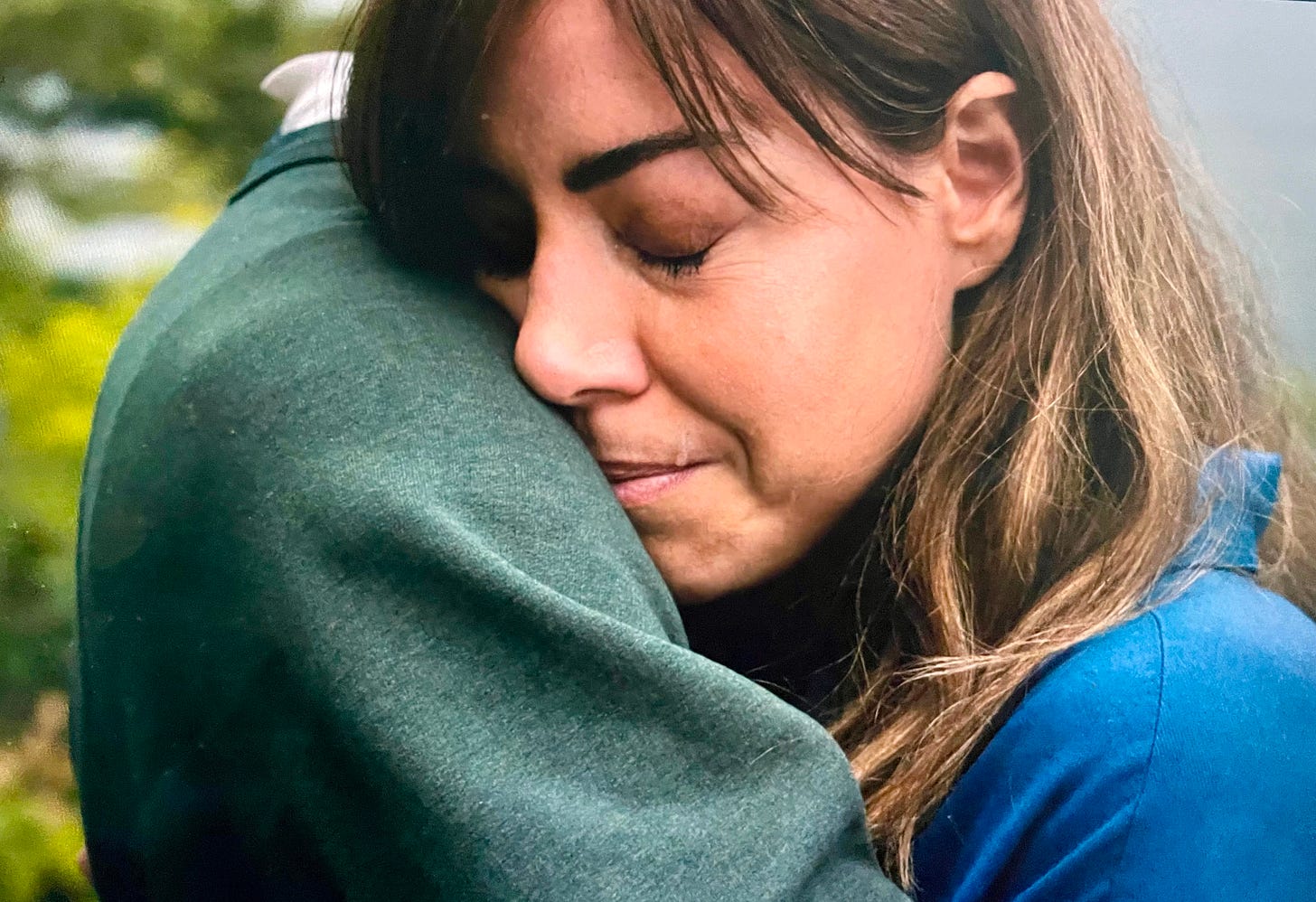HEADS UP! This post includes spoilers of the movie My Old Ass. If you haven’t watched it yet, run do not walk to catch it on Prime. Then please come back to join us here.

It’s the first few weeks of my kids’ summer break, and this past week, I was on my own while their dad was out of town.
When it’s just me here, I take up a lot more space – in my home and inside myself. My tasks are interrupted or abandoned through the house, children’s detritus barely picked up, dishes piled, dog hair floating through the air. When I’m the only adult around, my emotional vortex is more precise, more vivid. I have more space to feel things, and in turn I’m more affected by the things that make me feel.
In that messy spaciousness, I watched the 2024 movie My Old Ass, written and directed by Megan Park. Since then, I’ve been spending some time with my 18 year old self, and thinking a lot about grief.
Warning again! It’s all spoilers from here.
This is not a sad movie.
My Old Ass is hilariously charming, funny, and so joyous. It brilliantly captures the vibrant energy, spunk, and grit of its main character, Elliott (played by bright-eyed Maisy Stella, who I ADORED in the show Nashville), with generosity and depth. Elliott is 18 and in her final weeks home before going off to college – an era that is so rich in my own memory, despite the fact that I’m somehow about to turn 48.
Elliott goes camping with her two friends, takes mushrooms, and ends up opening a conversation with her 39-year-old self, her Old Ass, played with exquisite deftness by Aubrey Plaza. At first they chat face to face while Elliott trips, then, after her Old Ass programs her number into Elliott’s phone, throughout the following days.
I love the boldness of this premise. It could so easily be outrageous or silly. Instead, Elliott’s adventure into relationship with her future self is matter-of-fact, wise, hilarious, and without a drop of pretension. It reminded me immediately of how simple and direct it can be when we make contact with our parts through Internal Family Systems (IFS) work.
How would it feel to have our future selves on the other end of the phone, available for texts, open for connection at any moment?
When Elliott asks her Old Ass for advice, her older self isn’t sure what to share – not wanting to spoil anything and also unsure what would be meaningful. When she shares that she’s in a PhD program, younger Elliott is notably unimpressed. However, older Elliott offers her primary message in no uncertain terms: Stay away from someone named Chad.
A few scenes later, we see young Elliott meet Chad, and it doesn’t take long to understand why this might be difficult. Their connection is automatic and easy – a fountain anyone would want to drink from. Megan Park writes this relationship (and the actors play it) with a secret genius that renders it universal: their young love would feel relatable to any human who’s ever been 18.
At one point, young Elliott asks her Old Ass what does it feel like to fall in love, how do you know when it’s real. Her older self replies that it’s “safety and freedom, all at once,” which teenage Elliott naturally rolls her eyes and scoffs at. Even so, she and Chad model all the spark of this, effortlessly, from the jump.
My Old Ass goes on, all of it adorable, generous, and true. But the movie’s heart lives in the final 10 or 15 minutes. Elliott’s Old Ass confronts her younger self, who has slept with Chad despite being warned. Younger Elliott demands to know what he’s done wrong, to understand why she should stay away from him. Older Elliott finally shares that in the future, Chad dies – that he dies after Elliott has already fallen in love with him, and that there’s no way to stop it or save him. Her Old Ass has been here as protection for Elliott all along, her whole purpose to serve as a shield.
For anyone who’s worked with IFS, we recognize this: our protectors will turn themselves inside out to keep other parts of our system safe. So often they seem to travel through time, much like Elliott’s Old Ass, to distract or derail us, whatever is needed to change the story and prevent pain. But Elliott’s younger self pushes back. She insists that she will fall in love with him, despite knowing she will lose him. Because “if you aren’t young and dumb, you’d never fucking be brave enough to do anything.”
I think most of us old asses probably take this with a bittersweet nod of nostalgia. With deep respect for the open-heartedness of being young. The willingness to take on pain, before we knew the costs, before we were forced to unplug our hope.
My last year of high school, I lost a close friend who was, at times, also a boyfriend. His death was sudden, horrific, and left a gash in my adolescence that shifted every angle of my inner life.
A first love, a soulmate, an irreverent poet who introduced me to Whitman, Dylan, moody Irish landscapes, and Nine Inch Nails. We lived a few hours apart and corresponded mostly by letters, several a week, full of song quotes, rants, relentless flirting, and feverish need to know each other and to be known. Looking back on the rush and crush of it, I’ve wondered if he somehow knew his time was limited. Like he had some future self of his own reminding him not to spare one word.
Thinking about him now, I see he was what people would have called an old soul. He had an easy magic that drew everyone’s love to him. At the core, he was not like the rest of us, but truer, lovelier, more connected. Not at all unlike in look or energy from Chad, as depicted by Percy Hynes White:
So much of our early connection and the fire between us helped construct a cluster of parts that have been with me since then – he was an early architect in my becoming. I suppose I was in his as well, until he stopped becoming.
It seems when someone dies young, the memory of the loss usually outweighs the life. Here in midlife, it feels especially brutal to realize I didn’t even know him four years. I reach back often, trying to pull up some image, sense, memory – his voice or skin or what it felt like to stand next to him. I have no trouble accessing the memory of the bus ride to the funeral, how cold my feet were, the sound of his dad weeping in the funeral hall, the snow that melted in our hair as we put him in the ground.
So much of the rest of him now feels out of reach.
In My Old Ass, Chad talks with Elliott about how we never know the last time we’re going to do something. One day he was a kid playing make-believe, then one day he realized he no longer did that, and didn’t know when it stopped: “The thing about not saying goodbyes is that you also miss savoring when it might be the last time you’ll ever get do that thing.”
My kids’ dad has talked about this in parenthood: any moment could be the last time they want us to pick them up, make their breakfast, let them sleep in our room. I think of this when I watch them confidently march into summer camp or whenever I say goodbye to my mom.
The last time I saw my friend, I was in his town visiting a college, and we sat in a park and smoked cigarettes together. There was a distance between us that wasn’t typical. I remember thinking he seemed more grown up than I was, even though we were the same age. I felt so much that I wanted to say but stayed quiet, insecure about our connection, intimidated even. We hugged goodbye and weren’t sure when we’d see each other next.
For the first time ever, it seemed not as imperative that I know.
For years, I’ve had the same set of dreams about him. In one variation, I learn that I was responsible for his death and panic about whether others would find out. In another, he is alive again. It turns out he never died, he was just away for a while. We are our current ages, grown up together. In another, we’re together but he is still dead, still 17. We only have a short time but I get to talk to him the way I want to, say everything I couldn’t say then. When I hug him in this dream, the sensation of his specific hug is exactly as I remember it, only I don’t know that I still remember it until I arrive in the dream.
Back in the movie scene, as the two Elliotts talk, Chad shows up, and to their surprise, he can actually see Elliott’s Old Ass too. He greets her with a grin, then chats with young Elliott while her older self looks on.
We watch her, watching her beloved person stand before her, alive and entirely real. Then she watches her younger self talk with him, full of love and totally sprung. Last, her younger self watches older Elliott watch Chad, her awareness of this new future moving in a slow wave across her face.
What happens to everything we imagine for ourselves as kids?


In IFS, when my parts feel seen, they often end up wearing an expression similar to that of both Elliotts. The tender acknowledgment of being witnessed. The comfort and sorrow of being seen by the parts of ourselves we have so steadfastly turned away from.
When we lose someone, so much of what we need is to be witnessed. To have their life, their presence be known – they were here. To have our pain and the hole left inside us held and acknowledged. I witness my friend now through the eyes of my own older parts. I can see that despite his brilliance, his precociousness, he was also a lost teenager who struggled to place himself in the world. He worked so hard to meet the needs of those who loved him, me included. I’m not sure I ever got to see him in the way he needed.
When I look now with the eyes of my parenting parts, as a mother, I see it: he was a child who did not make it.
Older Elliott decides to leave the two standing together, but before she goes, Chad leans in for a hug – a sweet goodbye for the friend of a girl he’s falling in love with. We watch older Elliott take his hug in, the sensation exactly as she remembers it.
And so I’ve been thinking about grief all week. And trying to talk with my 18 year old self about it.
The last time while knowing it’s the last time. A full circle.
The grief of everyone we’ve lost, of all the hope that got turned off.
Of this moment on our planet.
The grief of parenthood – the lost sounds of my kids’ younger voices.
Of a long lonely partnership.
Aging parents.
The grief of distance, of longing, of everything already forgotten.
The grief of a tired body trying to remember.
One memory: About a year before my friend died, we had a brief falling out. I felt ignored, overlooked, hungry for attention I was sure was going to someone else. He felt squirrelly – devoted but distracted – and withdrew. I don’t know how we reconciled but I remember coming home to a message from him on my answering machine. When I played it, his voice echoed through the hallway.
I saved the miniature tape and played it over and over for years until it stopped working. But I also wrote it down at some point, after he had died – some younger part of me knowing it would be important:
Hey, it’s me. I’m just calling to tell you something I read. It’s an old Irish adage. It says: “The man who made time made plenty of it.” I thought that would make you feel better. You don’t have to worry about us. Call me back.
My Old Ass ends with Elliott cruising her boat around a lake, face open, full of heart, joyful. Not because she won’t experience pain or loss. Not even because she’s fallen in love. But because she’s been seen, by, through, and for herself.
Safety and freedom, all at once.
We recognize this feeling because we all remember it.








Oh my goodness. Wow. Thank you.
A beautiful, tender piece Bridget. Thank you for sharing your story and the loss you carry with you. I'm intrigued to watch the movie. My young self could certainly have benefited from my older self steering her at times, though would she have been ready to listen? Who knows....